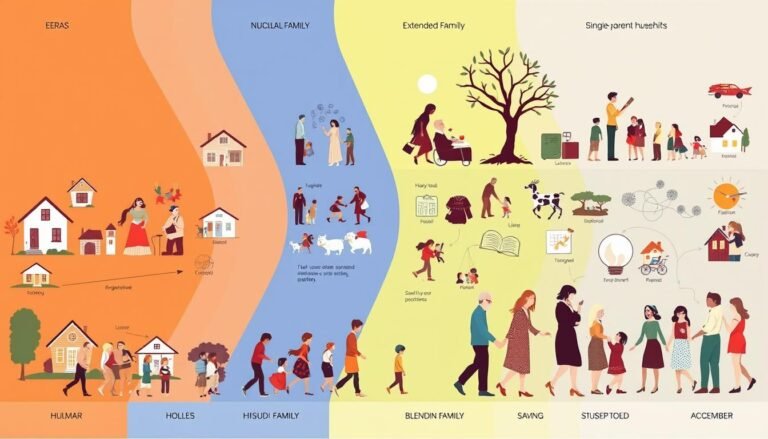The Role of Sociology in Public Policy Making
Can sociology really shape our laws? This question is debated by experts and policymakers. While economics is often key in policy, sociology brings a fresh view on social issues. This view is crucial for making good public policies.
In recent years, sociology’s role in policy analysis has grown. Sociologists use social research to help make policies based on evidence. They reveal societal impacts that might be missed otherwise. This work connects academic theories with real policy needs.
However, sociology faces hurdles in policy. The U.S. Congressional Record mentions sociologists only 57 times in the last decade. This is much less than the 3,333 times economists are mentioned. Sociologists need to make their voices heard more in policy talks.
Groups like the American Sociological Association are trying to help. They provide tools and resources for sociologists to talk to policymakers, journalists, and the public. By filing briefs with the Supreme Court and keeping an Experts Database, they make sure sociological research shapes important policy decisions.
Key Takeaways
- Sociology offers unique perspectives on social issues for policymaking
- Social research methods contribute to evidence-based policy decisions
- Economists are cited more frequently than sociologists in policy circles
- Organizations are working to increase sociology’s influence in policymaking
- Interdisciplinary collaboration presents new opportunities for sociologists
Understanding Public Policy: A Sociological Perspective
Public policy greatly shapes our society. A sociological view gives us deep insights into how policies change communities and social structures. It looks at how policy decisions lead to certain outcomes in society.
Defining Public Policy Through a Sociological Lens
From a sociological view, public policy is more than government actions. It’s a process that involves the community and looks at social effects. Public administration is key in this, making sure society’s needs are met with what we have.
The Intersection of Sociology and Policy Studies
Sociology and policy studies meet in many areas. Sociologists help make policies by:
- Analyzing social trends
- Evaluating policy impacts
- Starting community engagement projects
- Doing social impact assessments
Historical Development of Sociological Approaches to Policy
The link between sociology and public policy has grown over time. In the 1950s, public policy became a field that combines many disciplines in the US. Now, sociological methods help with policy-making at all levels, from local to worldwide.
| Decade | Key Development |
|---|---|
| 1950s | Emergence of public policy as a multidisciplinary field |
| 1960s-70s | Rise of social impact assessment in policy-making |
| 1980s-90s | Increased focus on community engagement in public administration |
| 2000s-present | Expansion of sociological approaches to global policy issues |
Despite challenges, sociology is crucial in shaping public policies. By linking research with policy needs, sociologists help make policies better and fairer.
Sociological Concepts in Policy Analysis
Sociology adds important ideas to policy analysis, making public policy studies richer. It looks at how people interact and what they care about in policy making. Network analysis, from sociology, is now key in understanding how policies are made and carried out.
Public sociology talks to people involved in public discussions. It helps sociologists tackle issues like social inequality and diversity. Wilson says we need sociological insights to solve problems like inequality and discrimination.
Sociologists have grown more involved in policy making. In the 1970s, they mainly set agendas and formulated policies. Now, they work on implementing and evaluating policies, using data to make decisions. This change shows how policy making has expanded beyond national borders.
“Sound scholarship is crucial for policymakers, as evidenced by the significance of having empirical data and theoretical scholarship in informing public policy.”
Sociological research helps civic groups, governments, and NGOs understand society. It’s key for tackling big issues like how family problems affect society.
| Sociological Concept | Application in Policy Analysis |
|---|---|
| Public Sociology | Addresses globalization, gender perspectives, societal contradictions |
| Network Analysis | Studies policy production and implementation |
| Multidimensional Perspectives | Analyzes inter-class, inter-religion, and inter-group relationships |
| Political Sociology | Evaluates public policies focusing on social justice |
The Contribution of Social Research Methods to Policy Making
Social research methods are key in making policies based on solid evidence. They help leaders understand complex social issues and make choices based on data. Let’s see how various research methods help in making policies.
Qualitative Methods in Policy Research
Qualitative methods give deep insights into what people think and do. They’re used in studies on child protection, education, and health issues like disability and homelessness. These methods let policymakers see the human side of social problems.
Quantitative Approaches to Policy Analysis
Quantitative methods provide statistical insights for policy analysis. They’re crucial in seeing how policies affect people and spotting trends. For instance, studies on smoking rates or sexual health often use numbers to guide policy decisions.
Mixed-Method Designs for Comprehensive Policy Understanding
Mixed-method designs mix qualitative and quantitative approaches. This method gives policymakers a complete view of social issues. It’s especially useful in complex areas like education reform or healthcare policy.
Despite their importance, sociological research methods face hurdles in policy making. The relationship between sociology and government policy has often been strained. Some policymakers see sociological research as less valuable than natural sciences. But, the push for evidence-based policymaking is boosting the need for strong social research methods.
Sociology’s Impact on Evidence-Based Policy Making
Sociology is key in making policies based on evidence. It gives deep insights into social structures and culture. This knowledge helps create better policy solutions.
Sociologists use data to guide policy decisions. Their work has led to big changes in education and health.
Studies show sociology’s big impact on public policy. In 2005, Michael Burawoy talked about public sociology. He said sociologists should tackle societal problems.
A 2010 study looked at sociology’s most popular topics. It found out what interests the public the most.
Assessing social impact is crucial in policy making. It shows how policies affect communities. For instance, a 2014 New York Times article shared data on social programs.
This kind of analysis leads to better policies.
“Evidence-based Policy Making and Evaluation” course at the University of Western Ontario shows how sociology helps in policy. It teaches future policy analysts to use sociological methods in government and research.
Sociologists offer unique views in policy debates. They look into complex issues like family and culture. This gives important insights for policy making.
By linking academic research with real-world needs, sociology helps make policies better informed and effective.
The Role of Sociology in Public Policy Making
Sociology is key in shaping public policy. It gives deep insights into social issues. This helps policymakers set the right priorities and find effective solutions. Sociology’s impact is seen in many areas, like social impact assessment, community engagement, and public administration.
Identifying Social Problems and Policy Priorities
Sociologists are great at spotting trends and issues in society. They use research to uncover problems that need fixing. For example, they’ve studied poverty, inequality, and discrimination to help tackle these issues directly.
Evaluating Policy Outcomes and Societal Impacts
After policies are made, sociologists check their effects. They see how new rules affect people’s lives and if they solve the problems they aimed to fix. This feedback helps make future policies better and ensures they help society as a whole.
Informing Policy Design and Implementation Strategies
Sociological research helps shape policy creation and action. It predicts outcomes and helps avoid bad side effects. For example, sociologists have helped develop strategies to reduce poverty and improve social integration.
- 16 students won awards in the 2023 Global Student Essay Competition on sociology in public policy
- 8 countries were represented among the winners
- Sociology has been used to study issues like poverty and social exclusion
- The field has informed both domestic and foreign policy decisions
By using sociological insights, policymakers can make better and more responsive solutions to the complex issues our communities face.
Sociological Theories and Their Application to Policy
Sociological theories are key to understanding social issues and shaping policies. They help policymakers tackle big problems like social inequality and diversity in public administration.
There are three main sociological views that guide policy: functionalism, conflict theory, and symbolic interactionism. Each gives a different look at how society works and changes.
Functionalism sees the government as doing four main things: planning for society, meeting social needs, keeping order, and handling international relations. It shows how social systems are connected.
Conflict theory comes from Marxist ideas and looks at social inequalities and power fights. It says conflicts lead to a fairer society. Events like the Arab Spring show how groups push for change and fairness.
Symbolic interactionism looks at how people interact and the power of symbols in politics. It shows how everyday talks and symbols like the White House shape decisions.
| Theory | Focus | Policy Application |
|---|---|---|
| Functionalism | Social system roles | Balancing institutional needs |
| Conflict Theory | Power dynamics | Addressing social inequalities |
| Symbolic Interactionism | Symbols and interactions | Improving political communication |
Using these theories, policymakers can make better plans to support diversity and inclusion. They can also tackle social inequality in public administration.
Addressing Social Inequality through Policy: A Sociological Approach
Social inequality is a big problem in our society. Sociologists are key in studying and fixing these issues. They help make policies for justice and equality. Their work helps make decisions that lessen differences and increase diversity and inclusion.
Analyzing structural inequalities in society
Sociologists look into different kinds of social inequality. This includes income gaps, unequal education access, and unfair treatment in the justice system. They focus on two main areas: inequality of conditions and inequality of opportunities. This helps policymakers find out why society is not balanced.
Developing policies for social justice and equity
With sociological insights, policymakers can make specific plans to fight social inequality. These plans might include full employment policies, better education for those who are disadvantaged, and stronger affirmative action programs. The goal is to give more chances and lessen prejudice and discrimination.
Case studies of sociology-informed inequality policies
Examples from real life show how sociology helps make good policies. For example, the #HeForShe campaign uses social media to push for gender equality. Many countries in Western Europe have made policies based on sociological studies. This has led to better social scores compared to the United States.
| Policy Area | Sociological Approach | Potential Impact |
|---|---|---|
| Education | Improving schools in low-income areas | Increased social mobility |
| Employment | National full employment policy | Reduced income inequality |
| Health | Better nutrition and health services for poor families | Improved health outcomes |
| Housing | Reducing residential segregation | Enhanced community integration |
By using sociological ideas in policy-making, we can make better plans to fight social inequality. Social impact assessments based on sociological studies make sure these policies really tackle the deep causes of inequality. This leads to lasting change and a more inclusive society.
The Role of Sociologists in Policy Advocacy and Consultation
Sociologists are key in shaping public policy through advocacy and consultation. They link academic research with real-world policy needs. This ensures social issues get a fair look in decision-making. Their work leads to policies that are more effective and fair for everyone.
The American Sociological Association (ASA) leads in promoting public involvement. In 2004, they started the Task Force on Institutionalizing Public Sociologies. This effort highlights sociologists’ roles outside the classroom. It aims to improve discussions on social issues and boost community participation.
Evidence-based policymaking is central to sociologists’ work in public policy. They bring research-backed insights to policy discussions. This helps create socially responsible solutions. Sociologists engage in various policy activities, including:
- Conducting community surveys and studies
- Testifying before Congress on critical issues like immigration
- Filing Amicus Briefs in landmark court cases
- Creating datasets for ongoing community research
Sociologists have made a big impact in policy areas like criminal justice reform and work-life balance studies. Their work shows the field’s dedication to solving social problems. They aim to make policy decisions that lead to positive change.
| Advocacy Activities | Outcomes Sought |
|---|---|
| Community organizing | Advancement of human welfare |
| Lobbying | Rationality of social decisions |
| Litigation | Constructive social change |
Challenges and Limitations of Sociology in Policy Making
Sociology is key in shaping public policy and making decisions based on solid evidence. However, it faces big challenges in turning research into real policy changes. It struggles to connect theory with what happens in the real world.
Bridging Academic Sociology and Practical Policy Needs
One major challenge is making sociological research relevant to policymakers. While many sociologists focus on deep research, policymakers often need fast, practical advice. This gap can stop sociological insights from being used in policy making.
Overcoming Disciplinary Boundaries
Sociologists must work across different fields in policy areas. They need to work with experts from various backgrounds. The American Sociological Association’s Sociology Action Network tries to help with this, but it’s not easy.
Ethical Considerations in Sociological Policy Work
Sociologists face tough choices between being objective and advocating for change. They must walk a thin line between providing information and shaping policy. This is shown in Burawoy’s four types of sociology: professional, critical, public, and policy.
| Challenge | Impact | Potential Solution |
|---|---|---|
| Research-Policy Gap | Delayed implementation of findings | Increased funding for engaged work |
| Disciplinary Boundaries | Limited cross-sector collaboration | Promotion of interdisciplinary projects |
| Ethical Dilemmas | Compromised objectivity | Development of ethical guidelines for policy work |
It’s important to tackle these challenges to make sociology more effective in shaping policy. By overcoming these obstacles, sociology can play a bigger role in making policies based on solid evidence. This will help address social issues more effectively.
Conclusion
Sociology plays a key role in making public policy. It uses social research and policy analysis to offer valuable insights. This approach has become crucial for making policies that really help society.
In France, sociology shows its power in policy-making. It shows how important it is to understand the role of bureaucrats in policy changes. By studying how top officials view certain reforms, we learn how sociology can guide policy decisions.
Policy-making is a complex task. It involves politics, interests, and making rational choices. Sociology helps us set clear goals for society’s growth. By applying sociology to policy, we can tackle social issues more effectively.
Looking ahead, sociology will keep playing a big part in policy-making. It will help improve governance and social outcomes in many areas. Even with challenges, sociology’s role ensures policies meet society’s needs and address complex social issues well.
Source Links
- Committing Sociology in Public Policy
- Policy Sociology — Sociology Policy Briefs
- An Appraisal of Sociology’s Contribution to Public Policy Analysis
- Intellectual Integrity and the Relevance of Sociology to Public Policy
- Crossing the quadrant: policy research and public sociology
- Why we need a Public Understanding of Social Science
- Sociology’s Impact on Society (Part VIII) – The Cambridge Handbook of Sociology
- Microsoft Word – 1161_9009_White_with_policies_updates
- The Value of Sociology in the Policy Sphere
- Bringing Sociology into the Public Policy Process: a Relational Network Approach – The American Sociologist
- Theoretical Perspectives on Government | Introduction to Sociology
- Popular Theories of Sociology | National University
- Microsoft Edge
- Social Justice and Sociological Theory
- 22.2 Public Sociology and Improving Society
- Sociology as Advocacy: There are No Neutrals
- Microsoft Word – DOCS-T448-v2-TF_on_Public_Soc__report_to_Council_8_05.DOC
- SOCF_12910 1124..1143
- Why Can’t Sociology Apply Itself? Progress and Limitations in Making Sociology Useful – Sociological Practice
- No title found
- Article – Kne Open







